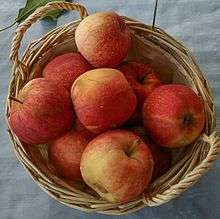Definify.com
Webster 1913 Edition
Gala
Ga′la
,Webster 1828 Edition
Gala
GA'LA
,Definition 2026
Gala
Gala
English

Proper noun
Gala
- A type of apple which is a cross pollination between Kidd's Orange Red and Golden Delicious
- Galashiels, a town in Scotland.
See also
-
 Gala apples on Wikipedia.Wikipedia
Gala apples on Wikipedia.Wikipedia
gala
gala
English
Adjective
gala (not comparable)
Translations
|
|
Noun
gala (plural galas)
Translations
Anagrams
Dutch

Pronunciation
Noun
gala n (plural gala's, diminutive galaatje n)
- ball (formal dance)
Faroese
Etymology
Verb
gala (third person singular past indicative gól, third person plural past indicative gólu, supine galið)
- to crow (of a chicken)
Conjugation
| v-58 | ||||
| infinitive | gala | |||
|---|---|---|---|---|
| present participle | galandi | |||
| past participle a26 | galin | |||
| supine | galið | |||
| number | singular | plural | ||
| person | first | second | third | all |
| indicative | eg | tú | hann/hon/tað | vit, tit, teir/tær/tey, tygum |
| present | gali | gelur | gelur | gala |
| past | gól | gól(st) | gól | gólu |
| imperative | – | tú | – | tit |
| present | — | gal! | — | galið! |
Icelandic
Etymology
From Old Norse gala, from Proto-Germanic *galaną.
Pronunciation
- IPA(key): /ˈkaːla/
- Rhymes: -aːla
Verb
gala (weak verb, third-person singular past indicative galaði, supine galað)
gala (strong verb, third-person singular past indicative gól, third-person plural past indicative gólum, supine galið)
Conjugation
Originally a strong verb, but now most usually weak; the strong conjugation is mostly archaic or poetic, and is especially rare in the present tense.
| infinitive (nafnháttur) |
að gala | ||||
|---|---|---|---|---|---|
| supine (sagnbót) |
galað | ||||
| present participle (lýsingarháttur nútíðar) |
galandi | ||||
| indicative (framsöguháttur) |
subjunctive (viðtengingarháttur) |
||||
| present (nútíð) |
ég gala | við gölum | present (nútíð) |
ég gali | við gölum |
| þú galar | þið galið | þú galir | þið galið | ||
| hann, hún, það galar | þeir, þær, þau gala | hann, hún, það gali | þeir, þær, þau gali | ||
| past (þátíð) |
ég galaði | við göluðum | past (þátíð) |
ég galaði | við göluðum |
| þú galaðir | þið göluðuð | þú galaðir | þið göluðuð | ||
| hann, hún, það galaði | þeir, þær, þau göluðu | hann, hún, það galaði | þeir, þær, þau göluðu | ||
| imperative (boðháttur) |
gala (þú) | galið (þið) | |||
| Forms with appended personal pronoun | |||||
| galaðu | galiði * | ||||
| * Spoken form, usually not written; in writing, the unappended plural form (optionally followed by the full pronoun) is preferred. | |||||
See also
Synonyms
- (scream): orga
Irish
Pronunciation
- IPA(key): [ˈɡal̪ˠə]
Noun
gala
- nominative plural of gal
Mutation
| Irish mutation | ||
|---|---|---|
| Radical | Lenition | Eclipsis |
| gala | ghala | ngala |
| Note: Some of these forms may be hypothetical. Not every possible mutated form of every word actually occurs. | ||
Italian
Etymology
From Medieval Latin, Latinized form of Frankish *wala (“good, well”), from Proto-Germanic *wal-, from Proto-Indo-European *welh₁- (“to choose, wish”).
Pronunciation
- IPA(key): [ˈɡaː.la], /ˈɡala/
Noun
gala f (plural gale)
Noun
gala m (invariable)
Anagrams
Kilivila
Pronunciation
- IPA(key): /ˈɡala/
Particle
gala
Idioms
- gala wala
Interjection
gala
Anagrams
References
- Gunter Senft (1986), Kilivila: the Language of the Trobriand Islanders. Berlin • New York • Amsterdam: Mouton de Gruyter, p. 223. ISBN 3-11-010781-3
Old Norse
Etymology
From Proto-Germanic *galaną, whence also Old English galan, Old Saxon galan, Old High German galan. Ultimately from Proto-Indo-European *gʰel- (“to shout, charm away”).
Verb
gala
Related terms
Descendants
Old Swedish
Etymology
From Old Norse gala, from Proto-Germanic *galaną.
Verb
gala
Conjugation
<div class="NavFrame" width: 100%;">
| present | past | ||||
|---|---|---|---|---|---|
| infinitive | gala | — | |||
| participle | galandi, -e | galin | |||
| active voice | indicative | subjunctive | imperative | indicative | subjunctive |
| iæk | gal | gali, -e | — | gōl | gōli, -e |
| þū | gal | gali, -e | gal | gōlt | gōli, -e |
| han | gal | gali, -e | — | gōl | gōli, -e |
| vīr | galum, -om | galum, -om | galum, -om | gōlum, -om | gōlum, -om |
| īr | galin | galin | galin | gōlin | gōlin |
| þēr | gala | galin | — | gōlu, -o | gōlin |
| mediopassive voice | indicative | subjunctive | imperative | indicative | subjunctive |
| iæk | — | — | — | — | — |
| þū | — | — | — | — | — |
| han | — | — | — | — | — |
| vīr | — | — | — | — | — |
| īr | — | — | — | — | — |
| þēr | — | — | — | — | — |
Descendants
- Swedish: gala
Polish
Etymology
Pronunciation
- IPA(key): /ˈɡa.la/
Noun
gala f
Declension
Portuguese
Noun
gala f (plural galas)
- gala (showy and festive party)
Verb
gala
- third-person singular (ele and ela, also used with você and others) present indicative of galar
- second-person singular (tu, sometimes used with você) affirmative imperative of galar
Swedish
Etymology 1
Noun
gala c
Declension
| Inflection of gala | ||||
|---|---|---|---|---|
| Singular | Plural | |||
| Indefinite | Definite | Indefinite | Definite | |
| Nominative | gala | galan | galor | galorna |
| Genitive | galas | galans | galors | galornas |
Derived terms
|
|
Etymology 2
From Old Swedish gala, from Old Norse gala, from Proto-Germanic *galaną.
Verb
gala (present gal, preterite gol, supine galit, imperative gal)
- to crow; to make a sound characteristic of a rooster
- förrän hanen har galit ... Och i detsamma gol hanen ... Förrän hanen gal
- before the cock crow ... And immediately the cock crew ... Before the cock crow (Matthew 26:34, 74, 75)
- förrän hanen har galit ... Och i detsamma gol hanen ... Förrän hanen gal